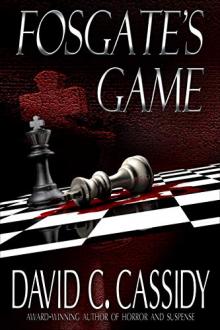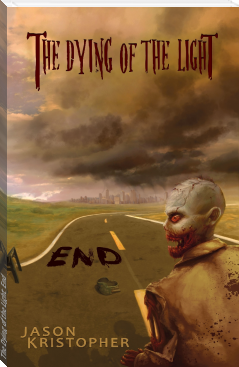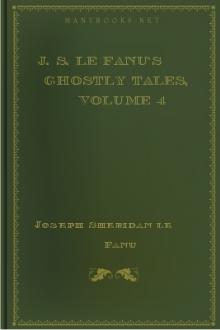Fosgate's Game - David C. Cassidy (life changing books to read .txt) 📗

- Author: David C. Cassidy
- Performer: -
Book online «Fosgate's Game - David C. Cassidy (life changing books to read .txt) 📗». Author David C. Cassidy
“Yes. Sorry. Where was I? The tables, thank you. Did I mention that he stopped and listened to some of the items? I did. Good. Well then, you have a fine sense of his oddness then. As I consumed my cake, he persisted a solid ten minutes in his search. Finally, he stopped at the table furthest from me and began moving items to and fro. One item in particular—heh, heh, I’m certain it was a fake, although still I can’t be certain—was a golden chalice. The man was extraordinarily cautious with it, trembling as he moved it from the table to a small shelf. As if God Himself should strike him dead should he drop it. The cup of a carpenter? I learned soon enough not to dismiss it.
“Security? I’ve no idea how he safeguards these things. Surely some of the texts are invaluable. And his recipe for Black Forest cake is positively priceless. But most of the articles in that shop—if not every last urn and chalice—must be counterfeit.
“Say no more, Chadwick. Has he taken this old Englishman for a fool? Perhaps. But then, perhaps not.
“The history! Ahhhh, yes. Let’s get to that, eh? Let me refresh you first. I think you’ll need it. How’s your condition? Good. Perhaps the storm will pass. There you are. A toast! To the past. To the future.”
~ 7“I suppose I’ll start at the beginning,” Fosgate said. “The proprietor had finally settled upon a large, rather nondescript chest. Oak, if I recall. He pondered a moment, and just when I had figured this was not what he’d been looking for, he produced a set of keys and unlocked it. Curiously, he raised the cover ever so gently so as not to disturb what was hidden inside. Like the chalice, he seemed in awe of it … respectful. And utterly fearful.
“Of course it was the extraordinary case you see here. My first impression was similar to your own. A rather disturbing affair, but one that offered a story begging to be told. Honestly, Chadwick, when he brought it to me I thought it might harbor nothing more than cutlery … perhaps some worthless treasure maps or trinkets.
“He removed the case from the chest and insisted I take it, and at first I protested. He slipped a key from his key ring—this one, yes—and handed it to me. I nearly dropped the whole mess I was so nervous, yet I’ve no idea why. But something swept through me, practically flooding my senses with want. The need to know. Whatever the facts, I was completely taken. It was as if a spell had been cast upon me by this strangest of magicians.
“He egged me on, and I opened it. What I saw made my skin crawl. Like you, I’d not wanted to be anywhere near these pieces, much less touch them. But they held this attraction, this power … I mumbled something or other, and the old man laughed.
“Curious … his laugh didn’t suit him. Nothing like I would have imagined it to be. Counterfeit. Like the rest of his collection.
“At any rate, the cards were stacked against me. Of all the curiosities strewn about the place, the old man had settled upon this. Yes, I’m certain. He knew. Knew no matter what the ask, I’d pay. You see, it wasn’t a question of price. It was a question of desire. Far more than you can imagine. The damned thing had a hold on me that was entirely intoxicating.
“Still, not really wanting to—you can understand how stupid I must have felt—I could hardly believe it when I informed him I’d take it. Without so much as asking the price! He laughed, clearly satisfied. Perhaps a part of him was relieved … to see it go, eh? Truth be told, the nape of my neck tingled at that laugh, and it still vexes me that I can’t reconcile that face with the laughter. It was of little consequence, however, for I’d been hooked—or rooked—as you’d so eloquently put it.
“Yet I digress. The set itself is hundreds of years old. It dates to the fifteenth century from what the German told me, but I suspect it is far older. He spoke of a Dark Prince, a brutal tyrant who held no soul. A man so sinister that to maim and to kill seemed like sport. Men, women, children … tortured … raped. Forced to eat their own excrement. Pregnant women slashed open, their unborn devoured by this demon. His bloodlust knew no bounds. I must admit, my own lust for the device had quickly soured.
“Yes, device. That’s what the man had called it. As if it contained gears and switches. I myself had questioned him on that choice of word, and at that, he told me of the witch.
“The Prince held deep ties to the occult, and according to legend—as relayed to me by this curious individual—his witch had presented this to her lord as a means of raging war against his greatest enemy at the time—Christianity. It had spread across Europe, and … well … you see his problem. The kingdom was in jeopardy. How well we understand.”
Chadwick sipped.
“What he told me next stirs anger and disgust,” Fosgate went on. “The Prince, having placed his faith in the device, used it that very night … to kill fifteen children.”
Chadwick stiffened. Close by, thunder threatened.
Drawing his pipe, Fosgate continued. “Upon this madman’s death, the set disappeared for almost half a millennium. Now, if you know your history, you’ll know that what were once the principalities of Moldavia and Walachia now constitute most of present-day Romania—yes, Transylvania. But this isn’t a vampire story, although it certainly holds root. You see, Walachia was ruled by several Princes—Vlad the Third, to be more precise—Vlad Tepes. Correct, Chadwick: Tepes … ‘The Impaler.’ Of course, Stoker based an entire novel upon him. And yes, Tepes ruled Walachia in the mid-fifteenth century. History tells us he killed thousands … perhaps twenty thousand.”
“Fosgate—”
“How many fell to the hand of this device?”
Chadwick chuckled nervously. Surely this was rubbish, after all. Yet in all his years, he had never known Fosgate to tell such a grand tale. Still, he had to admit that at some level he was truly enjoying this; it was as if they were two school chums camped around a fire, hanging on the very thread of a frightful ghost story.
“It was when the proprietor spoke of the Nazis that I started to believe,” Fosgate said. “The Fascists under Ion Antonescu controlled Romania. My father actually met him, of all places, in a café in Brussels in 1937. At some point, the set was discovered and fell into Antonescu’s possession. In 1941 he sided with the Axis, and to score points with the Germans—no doubt keenly aware of Hitler’s fascination with the occult—presented him with the set when they met in Bucharest.”
“That may be,” Chadwick conceded. “But it doesn’t prove the set was owned by Tepes.”
“Did you know that what is now Bucharest was originally a medieval fortress? And was itself the residence of the Princes of Walachia?”
Chadwick said nothing.
“Surely Hitler was intrigued,” Fosgate said. “Here was another toy to play with—another slice of his Final Solution pie. Almost immediately, he began experiments at Auschwitz.”
~ 8Chadwick sat forward, astonished by Fosgate’s assertion that this bizarre chess set had been used at the death camp of Auschwitz. “Rubbish. You’re not suggesting—”
“A million perished there,” Fosgate cut in. “Mostly the Jew. Most from starvation and extermination. How many fell prey to gruesome medical experiments? Further, I submit that some of the experiments went beyond science. I’ve become somewhat of an expert on the war, as you know. I’ve done some digging. There are several documented cases where prisoners were used in bizarre occult experiments. In one scenario, a captive would be brought into a room offering no more than the cold comfort of a wooden stool, whereupon they were instructed to sit and wait until further notice. After some length—the duration varied unpredictably, from hours to mere minutes—some of these poor devils would begin to shriek in terror. Without fail, they would claw at the door, pleading to be set free. Only when the screaming stopped—often much later, for fear of what lay beyond—would the soldiers open the door. Signed witness accounts testify to this.
“A good deal died in that room. The fortunate few who survived were completely mystified over the entire experience. Nothing at all had happened to them. They were shot, naturally, so as not to arouse undue suspicion. One could suppose that luck had smiled upon them, eh? Considering the madness that had taken the others. Still, it’s unclear why they’d been unaffected by the experiment.
“Indeed, Chadwick! Yes. I’ve asked myself that very thing. Why wasn’t the device used against the Allies? Perhaps it was. But consider: even a rigged game of chess takes several moves from opening to checkmate. Utterly inefficient. No. This is an insidious device, for more … shall we say … personal use. Hitler may have tried to eliminate Churchill or Stalin with it—I’m certain of that—but perhaps distance is a factor here. Whatever its power, its range may be limited.
“One other thing. Look at this. No. Here. On the inside of the case cover. Do you see?
“Forgery? That was my assessment as well.
“I engaged three independent handwriting experts to authenticate—or disprove—the signature. Each compared it against known, legitimate signatures. A perfect match.”
Chadwick met Fosgate with suspicious eyes.
Fosgate could only grin. “Even if the story is nothing more than a wild sales pitch, I’m guilty of succumbing to its charm. Yet of this I am certain: this is Hitler’s signature. That alone makes this discovery invaluable.
“Make no mistake, Chadwick. This is the genuine article. Take a look beneath the black Queen. Please … indulge me. She won’t bite.
“Intriguing, wouldn’t you say? Now examine the others.
“Quite right. Conspicuously absent from both Kings. Yet all others bear the mark.”
Still holding a white Pawn, Chadwick considered the inscribed pentagram at its base. He set the piece back and was glad to be rid of it. “Perhaps it’s due to the fact that a King can’t be used to defeat the other King.”
“Excellent,” Fosgate said. “Rules are rules, even in magic. As for the other pieces? What I now believe—as certain as that signature—is that the mark represents an instrument of death.”
“Preposterous,” Chadwick said, yet found himself doubting his disbelief. “Do you hear what you’re saying? To suggest—to entertain—that this is some sort of hocus pocus, to be used to slay one’s enemies … are you even listening to me?”
Fosgate seemed adrift in his own thoughts. He slipped the pipe from his lips and sipped some cognac. His monocle flickered in the sudden lightning. “I have photographs … but I’m aware of your delicate constitution. You see, those captives at Auschwitz—those in the experiments—I failed to mention a rather disturbing fact regarding their demise. Each victim died under different circumstances. Some gutted with a large knife or sword. Others hacked to death. Others beheaded. Shall I fetch the photos? No? I thought not.
“What tasks me is that all of this had gone on while they were isolated in a locked room. Yet there are no accounts of what actually transpired behind that door.”
“Nothing?” Chadwick said. “That’s hard to imagine, given the Nazis notoriety for keeping records.”
“Precisely. If there are records, they’ve eluded me. But ever the hunter, I did manage to track down an old film reel—and paid a fair price to have it restored. The film was quite damaged, but





Comments (0)